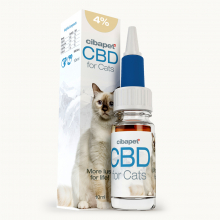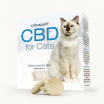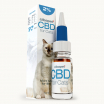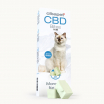Do Vets Recommend CBD Oil for Cats?
Published:
CBD oil has become an increasingly popular supplement for humans in recent years. But what about for our furry feline friends? Do vets recommend CBD oil for cats? Let's take a look at what the experts have to say.
Contents:
- What is CBD Oil?
- Do Vets Recommend CBD Oil for Cats?
- Why Don't Vets Universally Recommend CBD Oil for Cats?
- Are Any Vets Open to Using CBD Oil for Cats?
- What Should I Look for in a Quality CBD Oil for Cats?
- What Potential Benefits Does CBD Offer for Cats?
- How to Give CBD Oil to Cats: Dosing Guidelines
- Are There Any Side Effects of CBD Oil in Cats?
- Key Takeaways: Do Vets Recommend CBD Oil for Cats?
- What is CBD oil and how does it work?
- Is CBD oil safe for cats?
- In what cases might a vet recommend CBD oil for a cat?
- What should I look for when choosing a CBD product for cats?
- How much CBD oil should I give my cat?
- What’s the best way to give CBD oil to a cat?
- How long does it take for CBD oil to work in cats?
- Can cats have human CBD oil or marijuana?
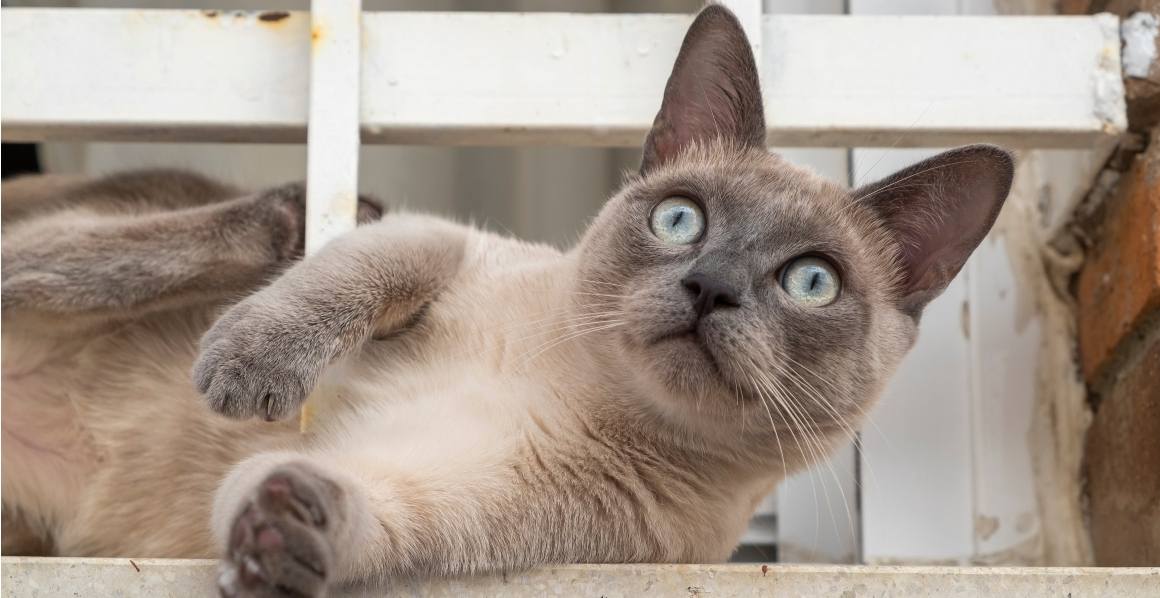
What is CBD Oil?
CBD, or cannabidiol, is a compound found in cannabis plants. CBD oil is an extract from these plants that contains high concentrations of CBD.
Unlike THC, the psychoactive compound in cannabis, CBD does not produce a "high". Instead, CBD interacts with the body's endocannabinoid system, which regulates various functions like pain, mood, sleep, and immunity.
CBD oil has gained attention for its potential therapeutic benefits for humans. But can it also benefit our feline companions?
Do Vets Recommend CBD Oil for Cats?
Many cat owners have started using CBD oil and CBD treats for their cats. They report benefits like reduced anxiety and pain relief.
But do veterinarians recommend CBD oil for cats? The answer is not so straightforward.
Here’s a quick overview of vets' stances on CBD oil for cats:
- The American Veterinary Medical Association has no official position on CBD for pets.
- Many vets recommend caution until more research is done.
- Some vets are open to CBD after ruling out underlying issues.
- Holistic vets tend to be more open to CBD based on anecdotal evidence.
So in summary, most mainstream vets urge caution given the lack of research. But some are open to CBD oil for cats if used appropriately under their guidance.
Why Don't Vets Universally Recommend CBD Oil for Cats?
There are several reasons why vets aren't universally recommending CBD oil for cats:
Lack of Research
There has been very little formal research done on CBD for cats. Without randomized controlled trials, vets don't have definitive evidence to recommend CBD.
The American Veterinary Medical Association states "the AVMA encourages further well-controlled clinical research to explore the potential benefits of cannabis-derived compounds for animals."
Quality Control Concerns
There is little regulation of CBD products, raising concerns about quality, safety, and appropriate dosing. The FDA has warned many CBD companies about unsupported claims.
Without oversight, vets worry about inconsistent CBD concentrations and contaminants in products.
Possible Side Effects
Some side effects have been reported in cats using CBD oil, including gastrointestinal upset and sedation/lethargy. Vets want to see more safety studies before widely recommending it.
Interactions with Other Medications
CBD may interact with certain medications like NSAIDs, antidepressants, anticonvulsants, and others. Vets want to understand these risks better before recommending it.
So those are the main reasons why veterinarians are hesitant about CBD oil for cats. More research is needed to establish proper dosing, safety, efficacy, and potential interactions.
Are Any Vets Open to Using CBD Oil for Cats?
While most mainstream vets urge caution, some are open to considering CBD oil for cats under certain circumstances.
These vets typically recommend CBD only after ruling out and addressing any underlying medical conditions first. And they emphasize starting with low doses and monitoring for any side effects.
Holistic veterinarians may be more open to trying CBD based on the anecdotal evidence. They view it as a natural supplement with potential to reduce anxiety, arthritis pain, seizures, and more in cats.
No matter what, it's crucial to only use high-quality CBD oil and to have guidance from your vet. Never give a cat any CBD product without their approval and supervision.
What Should I Look for in a Quality CBD Oil for Cats?
If you and your vet determine CBD may be worth trying for your cat, make sure to choose a high-quality, pet-specific product. Here are some tips for picking a good CBD oil for cats:
- Make sure it’s designed for pets. Don't give human CBD oil. Pet CBD has appropriate dosing and flavors.
- Review third party lab tests. Reputable companies will provide up-to-date Certificates of Analysis showing purity and CBD concentrations.
- Avoid added ingredients. Steer clear of CBD oils with additives like MCT oil that may be unsafe. Look for simple ingredients.
- Check sourcing and extraction methods. Quality CBD comes from organic hemp grown in the USA. CO2 extraction yields the purest CBD extracts.
Only purchase CBD products from companies committed to transparency and safety. And always consult your vet first before giving CBD to your cat.
What Potential Benefits Does CBD Offer for Cats?
While formal studies are still needed, cat owners do report several benefits of CBD oil based on their anecdotal evidence. Potential benefits include:
Relief from Chronic Pain and Arthritis
Cats can experience joint pain and arthritis just like humans. CBD may help reduce inflammation and ease chronic aches. But more studies are still needed to confirm effectiveness for cats specifically.
Anti-Anxiety Effects
Many cats suffer from situational anxiety. CBD’s calming effects may help anxious cats in stressful situations like vet visits, grooming, travel, or adoption.
Reduction in Seizures
For cats suffering seizures, CBD shows promise in reducing the frequency and intensity. But veterinary guidance is imperative when using CBD for this purpose.
Anti-Nausea
CBD may help reduce nausea and boost appetite. This could benefit cats with digestive issues or those undergoing treatments like chemotherapy.
Again, more research is still needed to prove CBD's benefits for cats. And your vet will help determine if CBD is appropriate for your individual cat's needs.
How to Give CBD Oil to Cats: Dosing Guidelines
If trying CBD oil for your cat, proper dosing is crucial. Here are some general dosing guidelines, always under veterinary supervision:
- Start low, go slow. Begin with the lowest dose and gradually increase under your vet's guidance.
- Give 1-2 times daily. Stick to either once or twice daily for consistent effects.
- Use pet CBD, not human products. Pet CBD is dosed properly for a cat's smaller size.
- Best delivery methods: Mix oil in food, use pet CBD treats, or add to water.
- Typical dosing: 0.5 mg - 2 mg per kg of body weight, twice daily is often recommended.
- Monitor for side effects like digestive upset and sedation. Report any adverse reactions to your vet.
Adhering to your vet's dosing instructions is crucial, as CBD can potentially interact with medications or cause side effects. Never exceed their recommended dosage.
Are There Any Side Effects of CBD Oil in Cats?
CBD is generally well-tolerated in cats, but some potential side effects have been reported, including:
- Dry mouth
- Low blood pressure
- Drowsiness
- Dizziness
- Loss of appetite
- Gastrointestinal upset like vomiting or diarrhea
Always monitor your cat after starting CBD and report any concerns to your veterinarian. NEVER give your cat CBD oil without approval and guidance from your vet on proper dosing and what to monitor.
Key Takeaways: Do Vets Recommend CBD Oil for Cats?
- Most vets urge caution on CBD oil for cats until more studies are done, but some are open to its judicious use under veterinary supervision.
- Lack of research, quality control issues, potential side effects, and medication interactions are top concerns.
- Anecdotal evidence suggests CBD may help relieve chronic pain, anxiety, seizures, and nausea in cats.
- If pursuing CBD, choose high-quality, pet-specific products and follow veterinary dosing instructions carefully.
- Monitor for side effects like digestive upset and sedation and report any concerns promptly to your vet.
While CBD shows promise for cats, more studies are still needed on its safety and efficacy. Always consult your vet before giving any CBD product to your feline companion. With proper guidance, CBD may turn out to be a helpful supplement for optimal health and wellbeing.
Frequently Asked Questions: Do Vets Recommend CBD Oil for Cats?
CBD oil has become popular for humans, but is it safe for cats? Here are answers to the most common questions cat owners have about CBD oil and whether vets recommend it.
What is CBD oil and how does it work?
CBD stands for cannabidiol, which is a compound derived from cannabis plants. Unlike THC, CBD is not psychoactive and does not produce a “high”.
CBD interacts with the endocannabinoid system, which regulates various bodily functions and helps maintain homeostasis. CBD oil may provide therapeutic effects by reducing pain and inflammation, alleviating anxiety, improving sleep, and more.
However, most claims around CBD oil are anecdotal and formal research on cats is lacking. Studies show promising results for conditions like arthritis, anxiety, and seizures, but more research is still needed.
Is CBD oil safe for cats?
There is no conclusive evidence that CBD oil is unsafe for cats. However, most veterinarians recommend caution until more studies confirm appropriate dosing, effectiveness, and side effects.
Potential side effects reported include gastrointestinal upset, changes in appetite and lethargy. CBD may also interact with medications. Always consult your vet before using to avoid complications.
In what cases might a vet recommend CBD oil for a cat?
Vets typically recommend trying CBD only after addressing any underlying conditions first. After ruling out other issues, they may consider CBD for anxiety, chronic pain, arthritis, seizures, cancer treatment side effects, and poor appetite.
Holistic vets may be most open to CBD based on anecdotal reports. But all vets emphasize starting with low doses and monitoring for side effects.
What should I look for when choosing a CBD product for cats?
It’s crucial to choose a high quality, pet-specific CBD oil, not a human product. Look for organic hemp sourcing, clean extraction methods, full third party lab tests, and a simple formula without unnecessary additives.
Dosage and potency should be tailored to cats. Only purchase from reputable brands that follow safe manufacturing processes and clearly state dosing guidelines.
How much CBD oil should I give my cat?
There are no official dosing guidelines, but general vet recommendations start around 0.5 mg - 2 mg per kg of body weight, given 1-2 times daily. Your vet will advise you on an appropriate starting dosage and any needed adjustments.
Always start with the lowest effective dose and increase gradually as needed. Only give the amount your vet recommends to avoid complications. Monitoring your cat's reaction is key.
What’s the best way to give CBD oil to a cat?
The most effective delivery methods are:
- Mixing oil into wet food or tuna water
- CBD pet treats
- CBD gels or capsules
- Adding a few drops to water or broth
Never force or restrain your cat to give CBD oil. Stop use if your cat strongly objects or avoids consumption.
How long does it take for CBD oil to work in cats?
It may take 2-4 weeks of consistent daily use to see effects. Unlike medications that act quickly, CBD works indirectly by interacting with the endocannabinoid system. Health benefits are cumulative over time. Have patience and stick to the dosing schedule.
Monitor your cat for improvements in symptoms like pain, anxiety, nausea, or seizures. Keep track of positive and negative effects to discuss with your vet at follow up appointments.
Can cats have human CBD oil or marijuana?
Never give your cat marijuana, cannabis, or human CBD products without veterinary approval. The ingredients and dosing are tailored for humans and can be dangerous for cats.
Only use pet-specific CBD oils recommended by your vet to avoid toxicity. Human products put your cat at risk of adverse effects. Stick to products designed for cat consumption.
Consult your vet before introducing any new supplements like CBD into your cat’s routine. With proper guidance, CBD may support your cat’s health - but safety comes first! Monitor your cat closely and report any concerns promptly.









